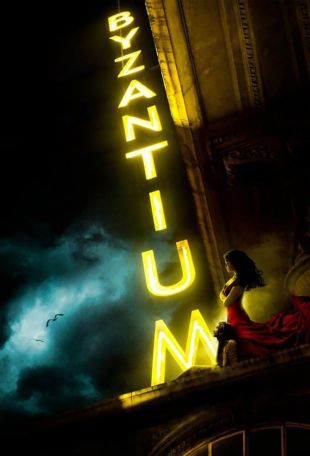
Byzantium probably got the green light because it involves vampires, and vampires are hot right now. But don't let that scare you -- Byzantium is a cerebral, British indie film, too ruminative and atmospheric to be lumped in with the likes of the Twilight series. And while director Neil Jordan is no stranger to the realm of making movies about tragically attractive vampires -- having helmed Interview With the Vampire back in 1994 -- this film bears little resemblance to that franchise either, eschewing all that foppish, operatic pageantry in favor of a restrained but heartfelt narrative.
The main characters are mother, Clara (Gemma Arterton) and daughter, Eleanor (Saoirse Ronan). The two may both look a bit too young to be separated by a generation, but keep in mind that 1. they are both mystical, immortal creatures, not bound to the same laws of physics and biology as the rest of us, and 2. Eleanor was born to Clara when she was a 13-year-old 18th century prostitute. We learn more and more about Clara and Eleanor's experiences back then as the story unfolds, but most of the film takes place in the present day, where Clara still uses the hardscrabble street smarts she's been employing for the past 200 years to keep her and her daughter out of the gutter, while the pensive Eleanor finds their existence increasingly troubling. One night, Clara is pulling a trick when she discovers that her goofy, uncomplicated john isn't really looking for sex, he's just in need of human contact, still grieving the recent death of his mother, who left him her long-neglected seaside hotel. Soon, Clara's disarming charms have the man wrapped around her finger, and mother and daughter have a new place to stay.
A few things make this premise interesting from the start. For one, Clara and Eleanor aren't automatically rich and powerful, the way that vampires tend to be in movies and books. They still carry around the same dysfunctions as normal people, just stretched out over a longer period of time. Eleanor, stuck in the mother-daughter dynamic for two centuries, has grown up enough to be calm, honest, and contemplative, but still grapples with the stunted emotional maturity she's reaped from years of isolation. At one point, she enrolls in school (which is necessary, to keep up the ruse they've arranged to stay at the hotel), and is given a writing assignment to tell a true story about herself. She decides, for the first time ever, to tell the real story of herself and Clara and how they became vampires, out of sheer frustration. Her teachers read the haunting tale of abuse and magic, of lowly human tragedy and mystic immortality, and assume, as any sane person would, that this is a cry for help, an allegory from a teenage girl about a troubled background and difficult home life. The irony is that while the story being told to the teachers is meant to be literal, the story being told to us is indeed an adroit metaphor -- and one about a woman's coming of age, no less.
